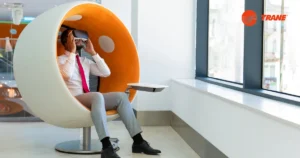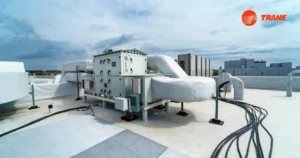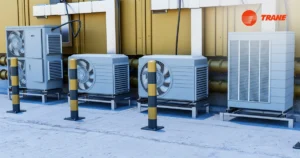The story of Egypt’s growth in the past decade is one of ambition, resilience, and adaptation. From the expansion of new smart cities like the New Administrative Capital to massive infrastructure projects across industry, health, and hospitality, the country has been in constant motion. But as these projects rise under the desert sun, one unsung technology has quietly become essential to sustaining progress: the air-cooled chiller.
Unlike traditional water-cooled systems that rely on extensive cooling towers and additional infrastructure, air-cooled chillers are designed for flexibility. They are often the first choice in environments where water scarcity, space limitations, or rapid deployment is a challenge. For Egypt, where average water availability has dropped below 560 cubic meters per person per year, well under the global water scarcity threshold; the preference is obvious. Every drop of water matters, and a system that minimizes usage while maximizing efficiency can be the difference between progress and compromise.
Cooling in a Water-Stressed Nation
Egypt ranks among the most water-stressed nations in the world. With 97% of its water supply coming from the Nile, the strain is already evident. The UN projects that by 2025, Egypt could face an annual water deficit of up to 20 billion cubic meters. Against this backdrop, industries, hospitals, and commercial developments must look toward cooling solutions that do not exacerbate the problem.
This is where the air cooled chiller proves invaluable. Operating without the need for cooling towers, make-up water, or complex piping systems, these units drastically reduce water consumption while still delivering reliable performance in the face of scorching summer conditions. They are also easier to install in locations where space is limited or where infrastructure cannot be built at scale.
Case Study: Keeping Cairo’s Healthcare Facilities Running
Consider one of Cairo’s largest healthcare complexes, which underwent rapid expansion during the height of the pandemic. The hospital’s existing systems were strained, and with critical care units requiring uninterrupted cooling for both patients and sensitive equipment, the challenge was urgent.
Installing a water-cooled system would have required significant construction, time, and water resources. Instead, the project leaned on high-capacity air cooled chillers. Delivered, installed, and operational within weeks, the solution provided stable, round-the-clock cooling, safeguarding both lives and equipment. This example illustrates why these systems are increasingly seen not just as an option but as a necessity in critical environments.
The Energy Efficiency Equation
Of course, efficiency is not just about water. Egypt’s electricity demand peaks every summer due to air conditioning use, often pushing the grid to its limits. The International Energy Agency (IEA) estimates that cooling already accounts for 10% of global electricity demand, and this figure is even higher in hot climates like Egypt’s.
Modern air cooled chillers offer advanced features such as variable-speed drives, intelligent controls, and the use of environmentally friendlier refrigerants. These innovations allow businesses to reduce energy costs and limit their carbon footprint while meeting cooling needs. For companies conscious of both operating expenses and environmental responsibility, this balance is critical.
Egypt’s New Cities and Cooling Needs
One of the most telling signs of Egypt’s trajectory is its ambitious development of smart cities. The New Administrative Capital, along with projects in Alamein and East Port Said, represents the next frontier of urban life. These cities are designed with sustainability in mind, incorporating green buildings, energy efficiency, and integrated infrastructure.
Cooling will play a decisive role in making these cities livable during the country’s hottest months. Here again, the flexibility and efficiency of air cooled chillers offer a strong match. With modular design, quick deployment, and minimal reliance on scarce water resources, they align with the principles guiding Egypt’s urban vision.
Cooling Beyond Permanence
Not every situation calls for a permanent installation. Construction sites, events, seasonal peaks, or emergency outages often demand immediate and adaptable cooling support. Trane Egypt has seen a steady rise in requests for solutions that can bridge these gaps—especially as industries work to avoid costly downtime.
The events sector, for instance, is one area where reliable cooling can determine success. Cairo’s growing reputation as a regional hub for conferences, exhibitions, and cultural festivals means organizers need systems that can deliver comfort without lengthy setup. Portable air cooled chillers, with their straightforward installation and compact design, have become a go-to solution.
Balancing Growth and Responsibility
Egypt’s cooling journey is not simply about managing heat; it’s about aligning national growth with sustainable practices. With global attention increasingly focused on climate action, solutions that minimize environmental impact while enabling industrial and social progress carry added weight. Businesses that adopt efficient systems are not just responding to immediate needs; they are positioning themselves as partners in Egypt’s broader sustainability story.
Trane Egypt, with its decades of experience in both permanent and temporary cooling solutions, continues to guide industries through this balance. By combining global innovation with local expertise, the company ensures that cooling systems are not just reliable but responsible. And when situations demand agility, organizations can rely on flexible solutions such as temporary air conditioning to keep operations, events, and communities running without interruption. Whether it is a factory awaiting a system upgrade or an international expo needing short-term cooling, these adaptable options ensure Egypt remains cool in every sense of the word.




